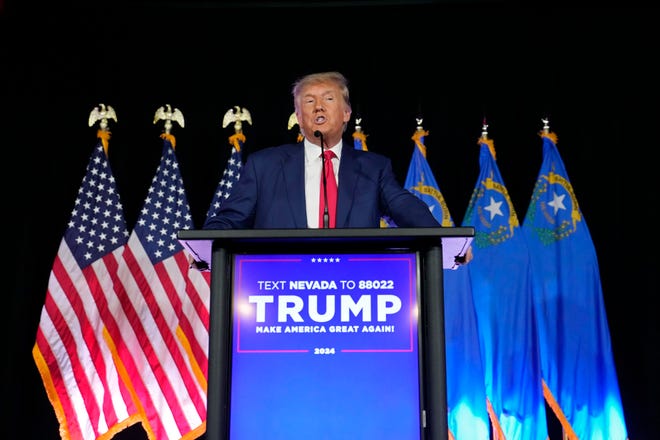Donald Trump asks Supreme Court to reject DOJ’s call for swift intervention in election fraud case
WASHINGTON — Former President Donald Trump asked the Supreme Court to steer clear of an unprecedented appeal that could resolve whether he is entitled to immunity from criminal charges over his role in attempting to overturn the 2020 election.
The extraordinary appeal was filed this month by special counsel Jack Smith, who in August secured a four-count indictment against the former president and 2024 GOP frontrunner for conspiring to steal the 2020 election. Before a lower court could consider those charges, Trump claimed he was immune from prosecution.
“The question stands among the most complex, intricate, and momentous issues that this court will be called on to decide,” Trump’s attorneys told the Supreme Court. Given that, they said, the decision should be resolved in a “cautious, deliberative manner − not at breakneck speed.”
If the Supreme Court agrees to take the case now, the decision would have enormous consequences for Trump’s extensive legal woes. The question is one of several pending before the nation’s top court that is thrusting the federal judiciary into the uncomfortable position of deciding questions that could determine Trump’s viability for a second term.
Get up to speed:A quick guide to Sandra Day O’Connor’s biggest decisions
The immunity issue is separate from a major 4-3 decision this week by Colorado’s Supreme Court that found Trump disqualified himself from a second term by inciting violence at the U.S. Capitol on Jan. 6, 2021. Trump has vowed to appeal the Colorado decision to the U.S. Supreme Court “swiftly,” forcing the nine justices to juggle multiple high-profile cases involving the former president.
Trump has repeatedly insisted that all of the cases against him are politically motivated attacks.
It’s not clear what the Supreme Court will do with Smith’s appeal. The justices could grant it and hear arguments or they could return the matter to the U.S. Court of Appeals for the District of Columbia Circuit, which is already considering the same case. Smith’s appeal essentially asked the Supreme Court to bypass the appeals court.
On Wednesday, Trump argued that the appeals court should act first, in order to allow the lower court to consider “these historic topic” and perform the “traditional winnowing function that this court has long preferred.”
Though the case raises fundamental questions about presidential immunity, the motivations are likely much simpler: Smith wants a trial as soon as possible and Trump would presumably like to delay the proceedings until after the election. At that point, a President Trump in 2025 could more easily swat away his legal troubles by directing the Justice Department to dismiss the cases.

U.S. District Judge Tanya Chutkan on Dec. 1 rejected a series of arguments from Trump to have the case against him dismissed. He has argued, for example, that he can’t be prosecuted because his alleged actions were “at the heart of his official responsibilities as president.” Trump appealed that decision, a move that appeared to jeopardize the start of a trial in that case, which is currently scheduled to begin March 4.
Smith argued that a delay is untenable and he urged the Supreme Court to expedite its review of the immunity case.
“The United States recognizes that this is an extraordinary request. This is an extraordinary case,” the government told the Supreme Court this month. The court should grant the case, Smith said, and “set a briefing schedule that would permit this case to be argued and resolved as promptly as possible.”


